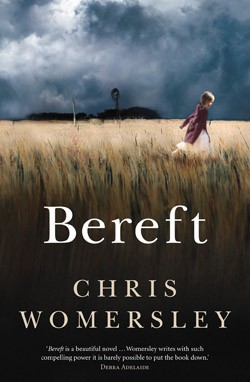An official announcement happens tonight, but I can reveal my result* now. The winner of the Mens’ Franklin Award for 2011 is: Chris Womersley for Bereft. [update below]
Congratulations, Chris, for a great effort, and only your second novel!
 (*A note on the methodology: This decision is based on the principle of the recently institution-sanctioned method of judging art prizes — devised by artist-judge Richard Bell and enacted by the AGNSW, 24 April 2011, reported here. Following Bell’s example I wrote the names of the three shortlisted authors (Kim Scott, Roger McDonald and Chris Womerley) on pieces of paper, folded them and scattered them on the floor. I then tossed a coin until it landed on one of the pieces, which became the winner.)
(*A note on the methodology: This decision is based on the principle of the recently institution-sanctioned method of judging art prizes — devised by artist-judge Richard Bell and enacted by the AGNSW, 24 April 2011, reported here. Following Bell’s example I wrote the names of the three shortlisted authors (Kim Scott, Roger McDonald and Chris Womerley) on pieces of paper, folded them and scattered them on the floor. I then tossed a coin until it landed on one of the pieces, which became the winner.)
So once again, a wonderful effort, Chris, for a fine piece of writing. (In line with the Bell Method I have not read any of the nominees, though Bereft is high on my to-read list. A friend on whose taste I depend, and who has lent me her copy, tells me that she and her father think it’s super.)
The local champions
Pertinently and usefully, we might also recognise some undersung local heroes: indie publisher, Scribe, led by the indefatigable true believer and domestic book industry champion, Henry Rosenbloom. (See his infrequent but hard-hitting blog.) And hats off to the Scribe fiction editor Associate Publisher, Fiction, Aviva Tuffield, who has had a stellar run with the Womersley book, Jon Bauer’s debut Rocks in the Belly, longlisted for this year’s Mens’ Franklin, and the high-profile Cate Kennedy’s debut novel, The World Beneath. Not only that but also introducing the Scribe Fiction Prize (for writers over 35; excellent idea) and her acclaimed annual collection of short fiction, now in its second year. Henry and Aviva, we salute you.
(Not least, a tick, too, for the designer Josh Durham’s charged, cinematic cover for Bereft.)
To the authors on the Men’s Franklin ultrashortlist, well done; feel utterly superior to all other Australian novelists of the year past (and maybe especially to the other six writers who were longlisted, who did they think they were kidding, eh?) — according to the MF chair, Morag Fraser, you three “stood out like beacons,” and your three books were all “groundbreaking.” She added, “We didn’t notice gender.”
Seriously, but: I think it’s okay to say that the rumour mill has awarded this year’s Mens’ Franklin to Kim Scott, on whom has been laid the “smart money.” (Scott won his first MF in 2000 for Benang, but it was judged only as good as another book — ie, he had to share the prize with Thea Astley … alas, a female.) For the rest of you writers, better Kylie lucky lucky lucky next time, because, on the matter of prizes, Sulman Award judge Richard Bell and Booker-winner AS Byatt can agree: “It’s a lottery!”
The pyramid of the arts
In case you nodded off a couple of months back — The Women’s Franklin Award: “The Stella,” as discussed on the Book Show. The report in Fairfax, and a tart and timely refresher, from the Guardian:
“I would argue that sexism is so ingrained in the arts industry as it stands that it is, unfortunately, necessary to find ways to draw the public’s attention to the work of women writers,” [Sophie Cunningham] said. “I’d like to quote [critic, poet and novelist] Alison Croggon on the subject … ‘A world loaded in favour of one sex accounts for the pyramidal structure of gender. At the wide bottom of the writing world — the world of amateur writers on the internet, for instance — women, if anything, dominate. The closer you get to the top, the fewer women there are. And at the very top, as in this year’s Miles Franklin, the presence of women is an exception. What to do about it? One thing is certain: passively assuming women are equal and will gradually work their way to equal status doesn’t work. We need some different tools.’ This notion of needing different tools is behind our desire to set up the award.”
+ + +
Updated Thursday 23rd June:
Kim Scott won the 2011 Mens’ Franklin Prize for That Deadman Dance. It came with $50,000. From the Australian:
Scott, 54, a descendant of the Noongar people of southeast Western Australia, said it was as “reassuring” to win his second Miles Franklin as it was his first, for Benang in 2000 “feels like a long time ago”.
I’ver been reluctant to mention the Indigenous connection, but it jsurt seems par for the course on reports. Suppose it’s unavoidable, as this book is all about that: ‘[it]centres on early, co-operative, black-white relations in colonial Western Australia. As such it is a story about what might have been, shadowed by the dark history of what did happen.”
Scott said that, although fewer women than men had won the Miles Franklin, an even more neglected group was indigenous writers. The only other indigenous winner since the award’s inception in 1957 (when Patrick White won for Voss) is Alexis Wright, for Carpentaria in 2007.
Are there statistics? I’m inclined to think rather more women writers have been eligible for the MF than Indigenous ones. But that’s a loser game to play those two groups off.
I’m not at all sure I’ll go and read That Deadman Dance. I confess I found Benang tiresome (and not memorable) and gave up without finishing. Though I will say that this is not so uncommon in my experience of Mens’ Franklin winning books. And my Bereft lender tells me her father hated That Deadman Dance, making some rather rude remarks, mildest of which were boring and confusing. But you want to read award winners, she said, and this is going to win awards! … In which case, he replied, I no longer wish to read award winners.








Crikey is committed to hosting lively discussions. Help us keep the conversation useful, interesting and welcoming. We aim to publish comments quickly in the interest of promoting robust conversation, but we’re a small team and we deploy filters to protect against legal risk. Occasionally your comment may be held up while we review, but we’re working as fast as we can to keep the conversation rolling.
The Crikey comment section is members-only content. Please subscribe to leave a comment.
The Crikey comment section is members-only content. Please login to leave a comment.